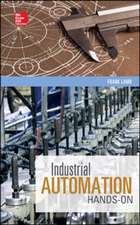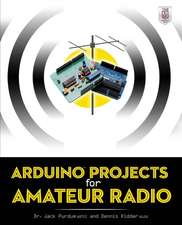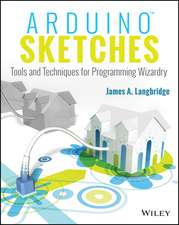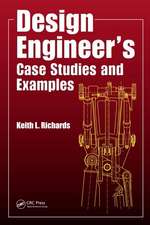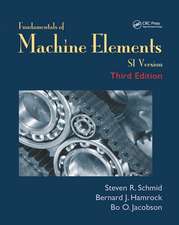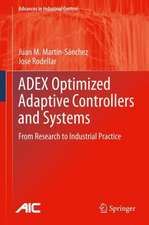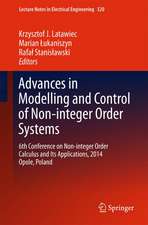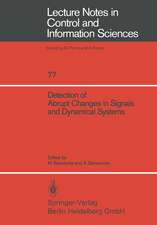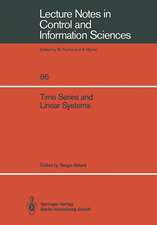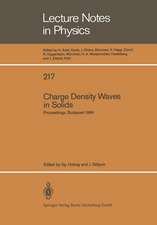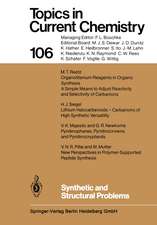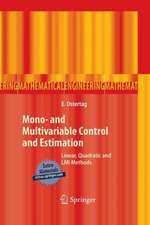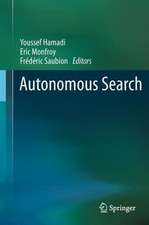Introduction to Discrete Event Systems
Autor Christos G. Cassandras, Stéphane Lafortuneen Limba Engleză Paperback – 29 oct 2010
This textbook is valuable to advanced-level students and researchers in a variety of disciplines where the study of discrete event systems is relevant: control, communications, computer engineering, computer science, manufacturing engineering, operations research, and industrial engineering.
| Toate formatele și edițiile | Preț | Express |
|---|---|---|
| Paperback (1) | 617.64 lei 6-8 săpt. | |
| Springer Us – 29 oct 2010 | 617.64 lei 6-8 săpt. | |
| Hardback (1) | 861.09 lei 6-8 săpt. | |
| Springer International Publishing – 12 noi 2021 | 861.09 lei 6-8 săpt. |
Preț: 617.64 lei
Preț vechi: 726.63 lei
-15% Nou
Puncte Express: 926
Preț estimativ în valută:
118.20€ • 122.95$ • 97.58£
118.20€ • 122.95$ • 97.58£
Carte tipărită la comandă
Livrare economică 14-28 aprilie
Preluare comenzi: 021 569.72.76
Specificații
ISBN-13: 9781441941190
ISBN-10: 1441941193
Pagini: 796
Ilustrații: XXIV, 772 p.
Dimensiuni: 178 x 254 x 42 mm
Greutate: 1.35 kg
Ediția:Softcover reprint of hardcover 2nd ed. 2008
Editura: Springer Us
Colecția Springer
Locul publicării:New York, NY, United States
ISBN-10: 1441941193
Pagini: 796
Ilustrații: XXIV, 772 p.
Dimensiuni: 178 x 254 x 42 mm
Greutate: 1.35 kg
Ediția:Softcover reprint of hardcover 2nd ed. 2008
Editura: Springer Us
Colecția Springer
Locul publicării:New York, NY, United States
Public țintă
ResearchCuprins
Systems and Models.- Languages and Automata.- Supervisory Control.- Petri Nets.- Timed and Hybrid Models.- Stochastic Timed Automata.- Markov Chains.- to Queueing Theory.- Controlled Markov Chains.- to Discrete-Event Simulation.- Sensitivity Analysis and Concurrent Estimation.
Recenzii
From the reviews of the second edition:
"This largely self-contained and extremely accessible textbook presents a unified treatment of DES essentially centred on automata and proceeds with a gradual increase in complexity by covering untimed, timed, and stochastic timed models. … suitable for senior undergraduate or junior graduate level clientele, this textbook maintains the same format with a profusion of exercises and a good set of references at the end of each chapter, making it extremely useful for supporting coursework." (Fernando Lobo Pereira, Mathematical Reviews, Issue 2009 f)
"This book is an introduction to discrete event systems that emphasizes modeling and control issues. … Several references and a Web site devoted to the book increase its value and usability. The book is well written and maintains a good balance of breadth and depth. It is highly suitable as a textbook, featuring various examples that make it easy to follow and understand the topics. It is already used in several universities around the world." (G. Ciobanu, ACM Computing Reviews, October, 2009)
"This textbook is a comprehensive introduction to the field of discrete event systems, emphasizing breadth of coverage and accessibility of the material to a large audience of readers with different backgrounds. Its key feature is the emphasis placed on a unified modeling framework for the different facets of the study of discrete event systems." (Tiit Riismaa, Zentralblatt MATH, Vol. 1165, 2009)
“A textbook for advanced-level students … and as a reference for researchers in the areas of control, communications, computer engineering, computer science, manufacturing engineering, operations research, and industrial engineering. … We consider Introduction to Discrete Event Systems among the best books that are excellent for both instructional and research purposes. … the book still enjoys its status as one of a kind in the field of discrete event systemsbecause of its quality, scope, utility, timeliness, and a wealth of important coherent topics.” (Andrea Paoli and N. Eva Wu, IEEE Control Systems Magazine, Vol. 29, June, 2009)
“Like the first edition, this edition provides a broad introduction to the field of discrete event systems. The book combines easy-to-read concepts and methods of such topics as language and automata theory, supervisory control. … This second edition is thoroughly and carefully revised and expanded. … The book is clearly written and well organized. … It will benefit both undergraduate and graduate students … . this book will be useful for researchers in a host of disciplines related to the study of discrete event systems.” (Technometrics, Vol. 51 (1), February, 2009)
"This largely self-contained and extremely accessible textbook presents a unified treatment of DES essentially centred on automata and proceeds with a gradual increase in complexity by covering untimed, timed, and stochastic timed models. … suitable for senior undergraduate or junior graduate level clientele, this textbook maintains the same format with a profusion of exercises and a good set of references at the end of each chapter, making it extremely useful for supporting coursework." (Fernando Lobo Pereira, Mathematical Reviews, Issue 2009 f)
"This book is an introduction to discrete event systems that emphasizes modeling and control issues. … Several references and a Web site devoted to the book increase its value and usability. The book is well written and maintains a good balance of breadth and depth. It is highly suitable as a textbook, featuring various examples that make it easy to follow and understand the topics. It is already used in several universities around the world." (G. Ciobanu, ACM Computing Reviews, October, 2009)
"This textbook is a comprehensive introduction to the field of discrete event systems, emphasizing breadth of coverage and accessibility of the material to a large audience of readers with different backgrounds. Its key feature is the emphasis placed on a unified modeling framework for the different facets of the study of discrete event systems." (Tiit Riismaa, Zentralblatt MATH, Vol. 1165, 2009)
“A textbook for advanced-level students … and as a reference for researchers in the areas of control, communications, computer engineering, computer science, manufacturing engineering, operations research, and industrial engineering. … We consider Introduction to Discrete Event Systems among the best books that are excellent for both instructional and research purposes. … the book still enjoys its status as one of a kind in the field of discrete event systemsbecause of its quality, scope, utility, timeliness, and a wealth of important coherent topics.” (Andrea Paoli and N. Eva Wu, IEEE Control Systems Magazine, Vol. 29, June, 2009)
“Like the first edition, this edition provides a broad introduction to the field of discrete event systems. The book combines easy-to-read concepts and methods of such topics as language and automata theory, supervisory control. … This second edition is thoroughly and carefully revised and expanded. … The book is clearly written and well organized. … It will benefit both undergraduate and graduate students … . this book will be useful for researchers in a host of disciplines related to the study of discrete event systems.” (Technometrics, Vol. 51 (1), February, 2009)
Notă biografică
Christos G. Cassandras is Professor of Manufacturing Engineering and Professor of Electrical and Computer Engineering at Boston University. He received degrees from Yale University (B.S., 1977), Stanford University (M.S.E.E., 1978), and Harvard University (S.M., 1979; Ph.D., 1982). In 1982-84 he was with ITP Boston, Inc. where he worked on the design of automated manufacturing systems. In 1984-1996 he was a faculty member at the Department of Electrical and Computer Engineering, University of Massachusetts/Amherst. He specializes in the areas of discrete event and hybrid systems, stochastic optimization, and computer simulation, with applications to computer and sensor networks, manufacturing systems, and transportation systems. He has published over 200 refereed papers in these areas, and two textbooks. He has guest-edited several technical journal issues and serves on several journal Editorial Boards. Dr. Cassandras is currently Editor-in-Chief of the IEEE Transactions on Automatic Control and has served as Editor for Technical Notes and Correspondence and Associate Editor. He is a member of the IEEE CSS Board of Governors, chaired the CSS Technical Committee on Control Theory, and served as Chair of several conferences. He has been a plenary speaker at various international conferences, including the American Control Conference in 2001 and the IEEE Conference on Decision and Control in 2002. He is the recipient of several awards, including the 1999 Harold Chestnut Prize (IFAC Best Control Engineering Textbook) for Discrete Event Systems: Modeling and Performance Analysis, and a 1991 Lilly Fellowship. He is a member of Phi Beta Kappa and Tau Beta Pi. He is also a Fellow of the IEEE.
Stéphane Lafortune is Professor of Electrical Engineering and Computer Science at the University of Michigan, Ann Arbor. He received degrees from Ecole Polytechnique de Montréal (B.Eng., 1980), McGill University (M.Eng., 1982), and the University of California atBerkeley (Ph.D., 1986). He joined the University of Michigan in 1986. He specializes in the areas of discrete event systems, fault diagnosis, supervisory control, and optimization, with applications to communication networks and transportation systems. He has published over 130 refereed papers in these areas, and one textbook. Dr. Lafortune is currently Department Editor of the Journal of Discrete Event Dynamic Systems: Theory and Applications. He served as Associate Editor and Associate-Editor-at-Large of the IEEE Transactions on Automatic Control in the period 1993-1999. He was a plenary speaker at various international meetings, including the 1996 International Workshop on Discrete Event Systems (WODES’96). He is the recipient of several awards, including the 1994 and 2001 George S. Axelby Outstanding Paper Awards from the IEEE Control Systems Society. He is a Fellow of the IEEE.
Stéphane Lafortune is Professor of Electrical Engineering and Computer Science at the University of Michigan, Ann Arbor. He received degrees from Ecole Polytechnique de Montréal (B.Eng., 1980), McGill University (M.Eng., 1982), and the University of California atBerkeley (Ph.D., 1986). He joined the University of Michigan in 1986. He specializes in the areas of discrete event systems, fault diagnosis, supervisory control, and optimization, with applications to communication networks and transportation systems. He has published over 130 refereed papers in these areas, and one textbook. Dr. Lafortune is currently Department Editor of the Journal of Discrete Event Dynamic Systems: Theory and Applications. He served as Associate Editor and Associate-Editor-at-Large of the IEEE Transactions on Automatic Control in the period 1993-1999. He was a plenary speaker at various international meetings, including the 1996 International Workshop on Discrete Event Systems (WODES’96). He is the recipient of several awards, including the 1994 and 2001 George S. Axelby Outstanding Paper Awards from the IEEE Control Systems Society. He is a Fellow of the IEEE.
Textul de pe ultima copertă
Introduction to Discrete Event Systems is a comprehensive introduction to the field of discrete event systems, offering a breadth of coverage that makes the material accessible to readers of varied backgrounds. The book emphasizes a unified modeling framework that transcends specific application areas, linking the following topics in a coherent manner: language and automata theory, supervisory control, Petri net theory, Markov chains and queueing theory, discrete-event simulation, and concurrent estimation techniques.
Distinctive features of the second edition include:
Distinctive features of the second edition include:
- more detailed treatment of equivalence of automata, event diagnosis, and decentralized event diagnosis
- expanded treatment of centralized and decentralized control of partially-observed systems
- new sections on timed automata with guards (in the Alur-Dill formalism) and hybrid automata
- an introduction to hybrid systems
- updated coverage of discrete event simulation, including new software tools available
- recent developments in sensitivity analysis for discrete event systems as well as hybrid systems
Caracteristici
Includes numerous detailed examples and student exercises Second edition incorporates essential elements of Hybrid System modeling, thus contributing to bridging the existing gap between time-driven and event-driven systems Includes supplementary material: sn.pub/extras

